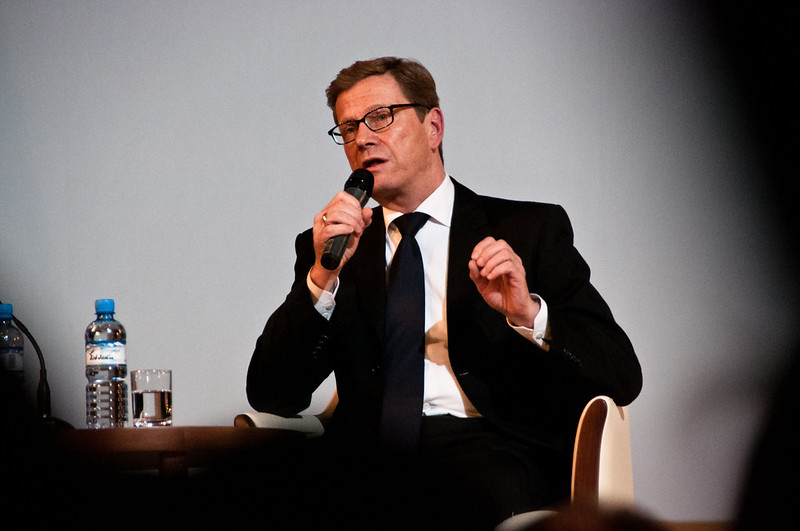Guido Westerwelle was one of the defining politicians of the last 20 years in German politics.
Guido Westerwelle’s life was a politician’s life, born and raised in Western Germany to his parents, both lawyers, he joined the liberal democratic party (FDP) early on, made himself a name in the party’s youth organisation, the young liberals, became protégée to one of the party’s leaders and rose to be the head of his party following the downfall of his predecessors. As head of the liberal party he lead it to both its biggest win (2009), that made him Vice Chancellor and Minister of Foreign Affairs, and its most resounding loss, that saw the party lose all its seats in parliament (2013), within one electoral cycle. As his party imploded, Westerwelle lost his party posts and resigned himself to his role of Foreign Minister. In the aftermath of the 2013 election, he founded an internationally oriented NGO, the Westerwelle Foundation, into which he poured his energies upon leaving office.
Mr Westerwelle, as everyone, had his share of goofs and things that didn’t pan out quite as intended: there was the infamous ‘Guidomobil’ for campaigning in the early 2000s, his boldly proclaimed aim of 18% of the votes for a party that has traditionally been located around 8%, if that and then there was ‘Man spricht hier Deutsch.’ (We speak German here) as a reaction to the question of an international journalist in a press conference. While the latter led to the new genre of ‘westerwave’ (Welle being the German word for wave) jokes and memes, his politics and politicking always far outweighed his involuntary comedy.
Politically, Westerwelle led his party on a neo-liberal course, supporting deregulation and criticizing the status quo and policies especially of the social democrats during Gerhard Schröder’s chancellorship (1998-2005) and the first grand coalition under Angela Merkel (2005-2009). This culminated in the FDPs unheard of 15% result in the 2009 elections due to being the beneficiary of protest votes against the previous coalition. The CDU-FDP coalition now known as Merkel II was a succession of political failures to and fro, especially on the side of Westerwelle’s FDP. As the smoke of the 2009 social democratic debacle cleared, it became painfully obvious that the FDP was exactly that those of us of opposing views had feared from the start: the FDP in fact was a party that had little more than one topic (deregulation), was in the hands of lobby organizations (hotel, pharma, you name it) and had personnel that had little to no idea what it was doing or motivation to do the jobs it was given. With the FDP being a predominantly economically focused party, Guido Westerwelle’s first pick of a post would have been the ministry for the economy, that being said, traditionally in Germany the smaller coalition partner gets the position of foreign minister and the role of vice-chancellor that has been tied to it. So he became foreign minister and vice chancellor and one of his seconds got the job Westerwelle actually wanted to have. Quite ironically, Westerwelle’s successor as vice chancellor, Sigmar Gabriel, now does head the ministry of the economy, as a more seasoned diplomat is foreign minister. Lucky him.
As a foreign minister, Guido Westerwelle had quite an extended ‘getting into it’ period that only really ended when he stepped down as head of the FDP two years into the electoral cycle (in the aftermath of many a lost state election and political debacles too numerous to recount here) and was able to focus on his diplomatic job. As his party imploded, Westerwelle finally did seem to come into his own and to have found a role that fit him better than previous ones. As his party imploded, Westerwelle finally did seem to come into his own and to have found a role that fit him better than previous ones. When his party was voted out of parliament in 2013 and started its process of rebuilding, Westerwelle left the public eye and continued his international work with the establishment the Westerwelle Foundation that was only hampered by his illness.
One aspect of Guido Westerwelle’s life that shouldn’t be worth mentioning but led to some diplomatic issues as a minister is that he had a husband. While his sexuality was public knowledge since the 1990s, Westerwelle was part of a group of high-visibility politicians that confirmed in the early 2000s what everyone already knew (he was technically the 3rd German politician to come out as gay when he did in 2004) – and the German public could hardly have cared less. As it should be. Needless to say, this led to some issues when planning diplomatic visits to less open countries as a minister, often with his entrepreneurial husband in tow, but even this was of little concern in the end.
Mr Westerwelle to me is a clear case of potential lost. Especially looking at the second part of his tenure as foreign minister and his work for the Westerwelle Foundation, I was genuinely looking forward to his contributions to the public at large as an elder statesman. As it stands, Westerwelle’s legacy will be little to none. He was ‘a politician’ with a biography like so many politicians, with his little successes and failures who only found his international calling late, after the height of his national political career. Too late to have a lasting impact as it turns out.
What is left is to remember not just the career politician he was for most of his life, but also the legacy he didn’t get to build and the contributions he didn’t get to make. We are at a loss for it.
Guido Westerwelle died after a protracted fight against cancer this morning. Our thoughts and well wishes are with his husband, family and friends.
Moritz Borchardt, 18/03/16
Cover image: Marco Fieber under a CC BY-NC-ND 2.0 creative commons license

